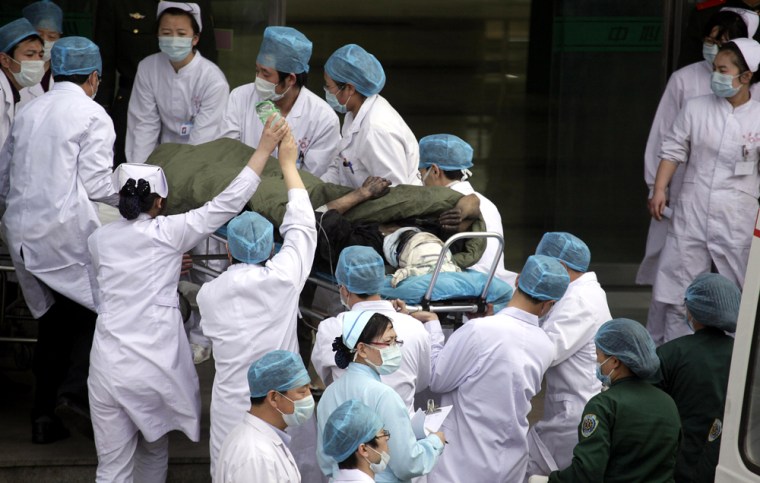At least 115 miners were pulled alive from a flooded coal mine in north China after being trapped for over a week, eating tree bark to survive and prompting jubilant officials to hail their survival a miracle.
Rescued miners wrapped in blankets were hurried to waiting ambulances that sped wailing to nearby hospitals. One clapped on his stretcher and reached out his blackened hands to grasp those of rescuers on either side.
"A miracle has finally happened," Liu Dezheng told reporters Monday morning, after the first nine miners were taken out shortly after midnight. "We believe that more miracles will happen."
Rescuers hugged each other at the scene. The sudden surge in rescues was a rare piece of good news for China's mining industry, the deadliest in the world. An official said 115 survivors had been pulled out as of 4:30 p.m. local time (4:30 a.m. ET).
'I'm good'
One of the surviving workers insisted on borrowing a cell phone from a doctor to call his family in central China's rural Henan province.
"I'm good. How are you and the kid?" he asked his wife, according to a report on the Web site of the People's Daily newspaper.
Of the 153 initially trapped, there are still 38 miners in the shaft. Rescuers expressed confidence Monday they could be saved but did not say whether there had been any contact with them.
"This is probably one of the most amazing rescues in the history of mining anywhere," said David Feickert, a coal mine safety adviser to the Chinese government.
Officials said most of the rescued miners were in stable condition, but state television said seven were in serious condition, The Associated Press reported.
Tapping
Rescuers have been pumping water out of the flooded mine since last Sunday, when workers digging a tunnel broke into an old shaft filled with water. The first signs of life from underground came Friday, when tapping could be heard coming up the pipes. Divers first headed into the tunnels over the weekend but found high, murky water and emerged empty-handed.
As the water level continued to drop, rescuers with rubber rafts squeezed through the narrow, low-ceilinged passages late Sunday and pulled out the first nine survivors just after midnight. Eleven hours later, the large wave of rescues began.
The rescuers then scrambled to understand the complicated situation underground and send down packages of glucose, milk and letters of encouragement. One read: "Dear fellow workers, the Party Central Committee, the State Council and the whole nation have been concerned for your safety all the time.... You must have confidence and hold on to the last!"
Survivors were then brought out from a working platform, where rescuers had drilled a vertical hole last week.
As the rafts approached the first trapped miners, one of them asked, "Can you get me out of here?"
The miners had spent eight days underground and some were soaked through. Some had hung from shaft walls by their belts for days to avoid falling into the water when asleep. Later, they climbed into a mining cart that floated by.
One miner described eating sawdust and tree bark and drinking the murky water, the leader of one of the rescue teams, Chen Yongheng, told a news conference Monday afternoon.
Liu Qiang, a medical officer involved in the rescue, said the survivors had hypothermia, severe dehydration and skin infections from being in the water so long. Some also were in shock and had low blood pressure.
Over the weekend, China was on public holiday for the traditional "tomb sweeping" festival, when people mourn their dead kin. The spectacle of the rescue has captured nationwide interest.
"As long as there's one percent of hope, we will still make a 100 percent effort," said Huang Yi, a spokesman for the national mine safety authority, according to Chinese television news.
Families of the survivors were thrilled. "He called and managed to say my sister's nickname, 'Xiaomi,' so we know it's really him and that he's alive," said Long Liming, who said he received a call around midday from his rescued brother-in-law Fu Ziyang.
A doctor then took the phone and said Fu had to rest, Long said. "He was trapped underground for so long, so he's very weak. But we are very relieved to know that he made it out safely."
In a sign of government concerns over possible social unrest, family members of the trapped miners said they have been kept under close watch in hotels and are not allowed to leave unless accompanied by minders.
Ignored water leaks?
It was unclear Monday how deep into the mine the rescued workers had been found.
"The miners in the lowest levels will be in the most extreme danger," Feickert said. "Just think of a tall building, with people on different floors, if that suddenly filled up with water."
A preliminary investigation last week found that the mine's managers ignored water leaks before the accident, the State Administration of Work Safety said.
Strong demand for energy and lax safety standards have made China's mines often deadly places to work, despite the government's drive to clamp down on small, unsafe operations where most accidents occur.
The number of people killed in Chinese coal mines dropped to 2,631 in 2009, an average of seven a day, from 3,215 in 2008, according to official statistics.
China has ordered the consolidation or takeover of many private mines. It says the shutdown of many of the most dangerous private operations has helped cut accidents.
But the worst accidents are not limited to private firms. The Wangjialing mine was a project belonging to a joint venture between China National Coal Group and Shanxi Coking Coal Group, two of China's larger state-owned firms.
